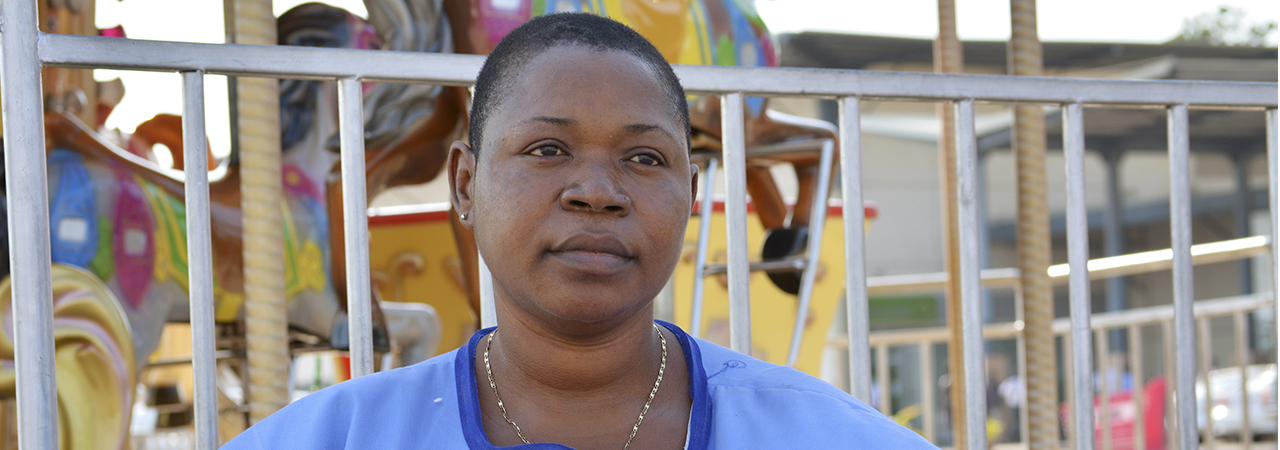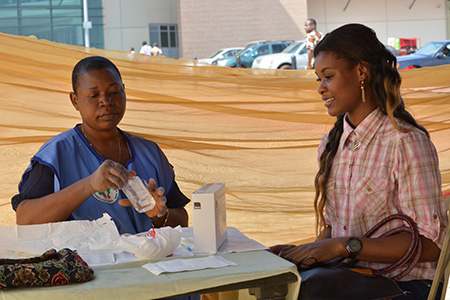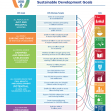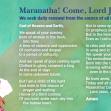

HIV Testing, Counseling in Nigeria
Ngozi Ifediagwu beams a welcoming smile at the young man who approaches her desk. Under a tent near a busy shopping mall in Enugu, Nigeria, Ngozi and her fellow volunteers provide counseling and HIV testing services to the public in a series of activities leading up to World AIDS Day.

"This is what we do in our outreach programs. We counsel, then test clients—in confidence—to determine their HIV status. These are people who indicate an interest to be so tested," Ngozi says.
HIV counseling and testing is one of the critical services provided under the Global Fund project by Catholic Relief Services in the southeastern Nigerian states of Enugu, Ebonyi and Imo.
In Nigeria, the National Agency for the Control of AIDS, on behalf of the Government of Nigeria, is one of the Global Fund's principal recipients for the grant. CRS and other organizations are subrecipients.
A key part of CRS' multipronged approach to prevention is encouraging people to know their HIV status. They receive counseling so they can make an informed choice about whether to be tested. The choice to be tested is entirely voluntary. CRS has trained volunteers like Ngozi to perform the tests.
"As a volunteer, I participate actively in CRS-organized outreaches to educate people about HIV," Ngozi says. "I counsel and test clients, including pregnant women at health facilities supported by CRS."
Volunteers play a key role in stopping the spread of HIV and AIDS. Some, like Ngozi, have tested positive for HIV. They work with others who have tested positive for the virus, and with local institutions to develop prevention, care and support activities. Services include promoting voluntary counseling and testing, referring people to health facilities, conducting awareness campaigns through mass media and providing home-based care.
Married with five children, Ngozi learned in 2004 that she had HIV.
"When I tested positive it was like the end of the world for me," she says. "However, the counseling and information I received gave me hope."
She began to play an active role in fighting HIV and AIDS, and to support other people who needed help.
"If others gave me hope, I too can give hope to others," she says.
Most people with HIV are stigmatized and face discrimination by the public. Some are even treated poorly in health care and education settings. They also may be shunned by family members, peers, and the wider community. For Ngozi, the experience has been different.
"People have accepted me. I have not experienced any form of stigmatization," she says. Furthermore, she says, clients who test positive for HIV are encouraged when they hear her story.
Clients counseled and tested as part of CRS' outreach are offered key messages that focus on abstinence and fidelity. Those who test positive are referred to CRS-managed health facilities for care and treatment. Teams of trained volunteers tour local markets and upscale city shopping districts, encouraging people to access the services, which are offered free of charge.
Ngozi says she values CRS' multifaceted approach of mobilizing, sensitizing, counseling and testing, and says she has learned much from this approach.
"One of the many things I appreciate about CRS in the fight against HIV and AIDS is its outreach approach, through which communities are mobilized, empowered with lifesaving information, then counseled and tested," she says.




